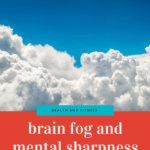This post may contain affiliate links. Full disclosure policy
THIS POST MAY CONTAIN REFERRAL LINKS. IF YOU CLICK THROUGH AND TAKE ACTION, I MAY BE COMPENSATED, AT NO ADDITIONAL COST TO YOU.
I had a light bulb moment last week. Not a bright, electric flash of brilliance but more of a foggy, faint glow.
While I was rummaging around my purse looking for my reading glasses for the tenth time that day, I started thinking to myself. I normally blame my missing glasses or car keys or forgotten passwords on my husband, but I have been on book tour. That means he isn’t around to blame.
I gasped.
Maybe it’s me after all. Maybe it’s my brain. Or my age.
This wasn’t the happiest realization, and it rocked me to the core. It was laced with dread and plenty of drama…
What if I am losing my mind? What if I have lost my ability to learn new things?
Then I snapped out of it. Because I am fierce. Brain fog messed with the wrong bunny.
One thing I know is that when I put my mind to something (if it’s working properly, that is), I can move mountains. In this case, I just wanted to find out how I can remedy this unpleasant state that is making me feel older than I am!
So I did what any self-respecting American does when they have a problem. I googled it.
It’s Not Aging, It’s Brain Fog
Google, in its infinite wisdom, promptly educated me on what was wrong with me.
Brain fog.
Boom, there it was.
As far as I’m concerned, fog is only charming if you are strolling around the English countryside with Mr. Darcy.
So I decided to dig deeper.
Brain fog can affect all ages. For many different reasons.
I reflected for a minute. I remember having “pregnancy brain” and then “mom brain,” then this thing I call “author brain,” and the weekly onset of “Monday brain.”
What is brain fog exactly?
Basically, it means our brains aren’t operating at 100%. We have trouble turning our thoughts into words, it’s hard to focus, we feel unorganized or confused.
Yes, that sounds familiar.
As I get older, I’ve found that I have a greater and greater fear of memory loss and things like dementia and Alzheimer’s. I’ve watched first-hand what happens to someone and their loved ones when memories and cognitive ability disappear into thin air.
I’m Not Alone
After completing my research, I took a sigh of relief. Upwards of 30,000 people each month are turning to Doctor Google and typing “brain fog” into that trusty search bar.
If one thing is certain, it’s that we’ve all been there. We’ve all had these moments.
Where on earth did I park my car?
Why can’t I think of that word? Oh, right, umbrella.
What did I get up to do again?
I can’t seem to focus today.
I feel like my head is in a bucket of water.
Where did that cat come from and why is he purring at me?
Q & A with A Dietitian
While sometimes it’s best to laugh it off, sometimes it’s your body trying to tell you something. And it’s important to listen.
I decided to call up my favorite fierce dietitian, Suzanne, and pick her brain on how diet can affect mental acuteness and staying sharp.
Here’s how our conversation went.
Q: Help! Why is this happening?
A: There are a number of things that cause brain fog—many of which you have control over. The tricky part is uncovering the root cause. Many of these common culprits are interconnected.
- Stress. Don’t even get me started on the adverse affects of stress on the body.
- Poor sleep. Aim for 7 to 9 hours. Be careful with your caffeine and alcohol intake as they affect quality sleep. Poor sleep sometimes leads to lots of coffee which leads to poor sleep which leads to lots of coffee. See where I’m going with this?
- Diet. This is a big one. I’ll elaborate on this one next.
- Medication. Certain over-the-counter and prescription medication can impair brain function. Pay attention to how your mind operates after you take these pills.
- Sinus issues. Especially bad during allergy season, nothing makes me feel more underwater than sinus issues. Then comes the vicious cycle of sinus medication that impairs brain function even further.
- Hormone changes. Some women take hormones to combat menopause-related brain fog.
- Dehydration. Your brain is mostly water and needs plenty of it to operate.
- Inactivity: Regular exercise can reduce stress and increase energy levels, both of which may improve mental focus.
- Medical conditions. There are several medical conditions that can cause brain fog, including chronic fatigue syndrome, depression, MS, Celiac Disease, Lupus, and others, according to WebMD. If you suspect any of these illnesses, call your doctor.
Q: Tell me more about how diet and brain fog are related.
A: The connection between our brain and our gut is well-documented, and when your body isn’t in sync, it can lead to inflammation. While inflammation isn’t inherently bad and we need it to ward off infection, we need balance or it affects our mental performance, or even worse, can lead to chronic diseases like heart disease, cancer, and arthritis.
One of the top symptoms of inflammation? You guessed it. Brain fog.
Altering your diet is one of the best ways to combat mental cloudiness. While the Anti-Inflammatory Diet and the Mediterranean Diet sound like trendy celebrity fads, they have a lot right in terms of warding off brain fog.
There’s a lot of literature out there on these diets, but the general rule of thumb is to stick to a diet high in fiber, healthy fats, and protein, and low in refined carbohydrates, sugar, saturated fats. Cut out trans fats, refined sugars, and processed foods altogether.
Furthermore, it’s possible you may have a food sensitivity that’s causing inflammation, where your body isn’t digesting certain foods as it should. Brain fog is one of the key symptoms. Since this could be triggered by anything, the best thing to do is get tested or pay close attention to how you feel after a certain type of food. This is highly personal and difficult to pinpoint, but it’s so important to identify trigger foods and cut them out of your diet.
Q: What changes can we make in our diet to overcome brain fog?
A: This list could go on for days, but here are a few things to remember when feeding your brain for mental acuity.
Fat is your friend: The brain is more than 50% fat. That means that essential fatty acids need to be part of our everyday diet. Our bodies don’t make essential fatty acids so we absolutely have to get them from food. I try to incorporate healthy fats into my breakfast for a brain boost—eggs, avocados, oatmeal with a drizzle of flax seed oil and chia. I use olive oil in my cooking because of its proven benefits to fight inflammation and eat omega-3 rich fish at least twice a week.
Brain Fuel: Vitamins A, D, E, and K come from healthy fats and all contribute to optimized brain function. When your brain is deficient in D, it can lead to brain fog and memory issues. Enjoying a little sunshine is one way to get Vitamin D, but also look to foods like salmon and tuna and combine then with ingredients high in fat-soluble A, K, and E, which helps you absorb more Vitamin D.
Cut the sweets: I know it’s hard, but too much sugar in your diet leads to pro-inflammatory stress hormones which leads to brain fog. They can also contribute to blood sugar drops that slow your brain function. There’s so much research around the negative affects of sugar on your body, including this study from Harvard.
Go for color: Brightly colored fruits and veggies get their hue from things called flavonoids, which are known to improve memory and brain function. Berries and grapes, for example, can improve memory and learning.
Treat Yourself: Known for its antioxidant properties, dark chocolate is proven to increase blood flow to the brain and its also a superfood!
Q: Are there Any Healthy Habits that can Help?
A: Yes! Don’t forget those snacks. Again, blood sugar is important to monitor. Skipping a meal can result in low blood sugar and your brain can’t function at its best. Two healthy snacks a day of things like low-fat Greek yogurt, fruit, and walnuts will help you stay sharp. I keep a tin of almonds in my car for healthy fat on the go.
Q: Can Supplements Help?
A: Absolutely! Take a probiotic for gut health (I use this one), a good quality omega 3 supplement like I mentioned in our last chat, and a multivitamin with plenty of Vitamin B12, which is associated with normal function of memory, focus, and concentration.
Sharpness Over Fifty
Phew! That is thrilling. More chocolate. Got it.
This discussion has really got me thinking! With mental sharpness on the brain, stay tuned for another blog all about easy ways to sharpen your mind over fifty. (Because, yes, we’ll take all the help we can get!).
In all seriousness, if this has taught me anything, it is that we must be proactive with our health, especially as we age. Don’t forget your annual physical and annual blood panel. If you suspect brain fog, it’s important to see your doctor.
Lastly, thanks to Suzanne for her infinite wisdom on diets over fifty and giving me an excuse to eat chocolate every day.




